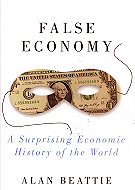|
False economy : a surprising economic history of the world
|
|
Alan Beattie
|

|

Can we analyze the fates of countries in a way that will help us analyze the fault lines and successes that can make or break a civilization, a city, or a culture? In False Economy Alan Beattie weaves together elements of economics, history, politics, and human stories, revealing that governments and countries make concrete choices that determine their destinies. He opens larger questions about the choices countries make, why they make them or are driven to make them, and what these choices can mean for the future of our global economy, as we go forward into uncharted territory.
Economic history involves forcing together disciplines that fall naturally in different directions, the universal explanation versus the individual narratives. But Beattie has written a lively and lucid book that engagingly and thought-provokingly marries the two disciplines and reveals their interdependence. Along the way, you'll discover why Africa doesn't grow cocaine, why our asparagus comes from Peru, why your keyboard spells QWERTY, and why giant pandas are living on borrowed time …
Beattie uses extraordinary stories of economic triumph and disaster to explain how some countries have gone wrong while others have gone right, and why it's so difficult to change course once you're on the path to ruin.
Alan Beattie, graduated from Balliol College, Oxford, with a degree in history. After taking a master's degree in economics at Cambridge, he worked as an economist at the bank of England and then joined the Financial Times in 1998. Currently the paper's world trade editor, he writes about economics, globalization, and development.
|
|
